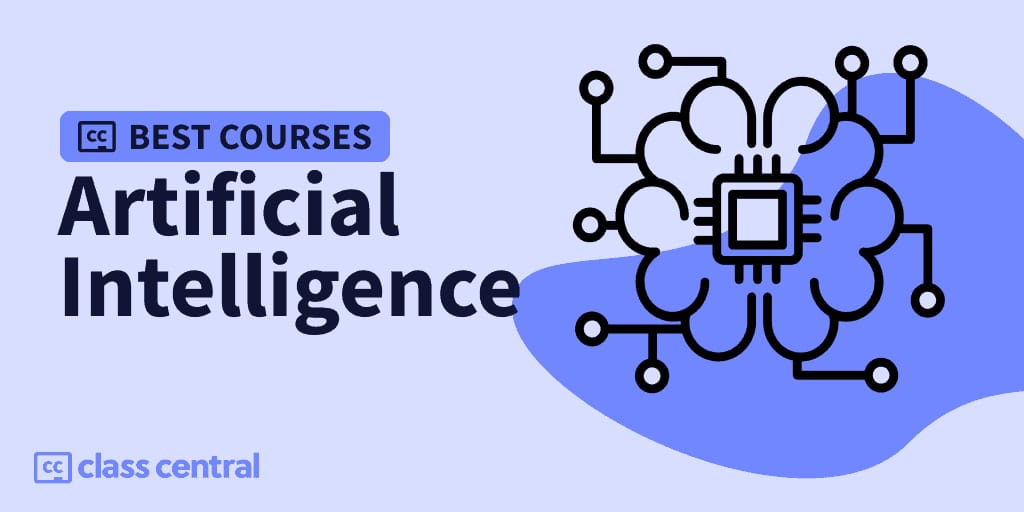Artificial intelligence courses teach students to develop AI-powered solutions. The best and most sought-after AI courses include a complete curriculum on fundamentals in machine learning, deep learning, natural language programming (NLP), and computer vision. Such courses also emphasize learning by doing; real-world projects create an opportunity for students to apply AI algorithms in various settings, including automation, data analysis, and predictive modeling.
The courses are usually provided by industry experts and align with all the recent advancements in artificial intelligence technology. This makes it applicable in the constantly changing technology landscape. They cater to the needs of a large audience, from beginners to professionals, hence offering personalized learning paths, certifications, and flexible schedules. Joining the course will cover programming in Python, cloud-based AI tools along with AI frameworks like TensorFlow and PyTorch.
The top-demanded course usually comes from a prestigious institution or platform such as Stanford, MIT, Coursera, edX, and these courses are tailored to the market needs of AI applications in various fields such as healthcare, finance, and robotics. Thus, it is reported that national graduates are mostly employed in high-paying and in-demand positions such as AI engineers, data scientists, and machine learning experts. Therefore, these courses establish career upgrading opportunities for many tech experts.
1. Machine Learning by Andrew Ng (Stanford University at Coursera)
This course is perhaps the single best course for introductory learning concepts about machine learning taught by Andrew Ng, the world’s best teacher in AI. It covers topics under supervised learning—linear regression, logistic regression, and support vector machines. It also covers some topics under unsupervised methods of learning, such as K-Means clustering and PCA (Principal Component Analysis). The course will also introduce some aspects of reinforcement learning and make connections to probabilistic systems of AI. The course targets learners of all levels: beginners and advanced. This is because it will emphasize the underlying mathematics involved in algorithms and their applications in real-world problems. Quizzes, programming assignments, and a final project comprise the means by which all the knowledge gained will be re-emphasized. It is estimated that this course will take about eleven weeks with a study requirement of three to five hours per week. Auditing this course is free, and there is a fee of $79 to obtain the certificate. That qualification becomes a valuable addition to a resume, as it will be an important attribute for career improvement in the data science and AI field.
2. Deep Learning Specialization (DeepLearning.ai on Coursera)
Andrew Ng’s Deep Learning Specialization is actually a whole series of five courses targeted at neural networks and all their various applications. The specialization introduces you to the basics of artificial neural networks before introducing you to even more complex networks, such as convolutional neural networks (CNNs) for image data and recurrent neural networks (RNNs) for sequence data and beyond. It also tackles attention and sequence-to-sequence models. Then, using TensorFlow, the student does practical projects including building image classifiers and language models. It takes around 3-5 months, with a weekly engagement of 3-7 hours, which is great for anyone who works alongside studying. Those who prefer to pay monthly charge $49 per month and students are encouraged to progress steadily through the course. Each next course builds on the previous one, creating a seamless and structured path towards mastering deep learning. Thus, students will emerge not only learning the theory of deep learning but also experiencing some practical coding and implementation associated with AI systems.
3. AI for Everyone (DeepLearning.ai at Coursera)
AI for Everyone demystifies artificial intelligence for those coming from a non-technical background. Also suitable for managers, business leaders, and those wanting to learn how AI impacts industries and decision making, they will come across topics such as: what AI can and cannot do; what types of data are needed in AI projects; and an overview of some important ethical considerations for putting such systems into practice. There is no heavy technical jargon here; it’s all about practical applications with real-world case studies. The duration of this course is four weeks with an expected commitment of 2-3 hours of work per week. That being said, working professionals will also find it manageable. The course can either be audited for free or paid up to $49 for a certificate, as proof of completion of the program. The content was engaging and accessible, with Andrew Ng explaining the ideas very clearly and effectively. By the end of the course, students will be prepared to participate in internal or organizational dialogues about AI and implement strategies in their businesses.
4. Harvard University: CS50’s Introduction to Artificial Intelligence with Python edX
This course will teach you the very basic concepts of AI with Python. Search (breadth-first and depth-first search), optimization, and machine learning techniques are introduced. Students create projects such as a tic-tac-toe bot or a handwriting recognition system while gaining practical programming experience. The course will require participants to spend about 6-9 hours per week for 12 weeks through rigorous classes and assignments. Auditing for the course is free, certification is charged at $199. The design prepares a learner to understand theoretical ASE principles and understand how an application functions in a coding environment. Harvard’s CS50 series is known for its depth; therefore, it is a great study for anyone who plans on changing jobs to work in AI.
5. Artificial Intelligence: Principles and Techniques (Stanford Online)
This advanced course will help you explore the core principles governing AI – logical reasoning, probabilistic modeling, machine learning, and robotics. Designed for students who already know a bit about mathematics and programming, this course emphasizes analytical and computational problem-solving. It will be for 10 weeks, costing 10-12 hours per week, and serious students will mostly benefit from everything involved. The fee will range between $500 and $1,000 depending on the type of enrollment. Students engage in projects and problem statements where they need to apply their theoretical concepts in a practical context. This course therefore instills a rigorous capacity-building foundation in participants with respect to their future advanced roles in AI R&D.
6. Professional Certification in Artificial Intelligence by IBM on edX
This is a professional certificate program by IBM and is a multi-course program covering machine learning, Python programming, and hands-on projects in artificial intelligence. The learner builds foundational knowledge of AI and then progresses through more complex deep learning and natural language processing applications. The program lasts for about 6 months and requires a commitment of about 4-6 hours every week to make it suitable for working professionals. The program fee is $800 for access to all course materials and certification upon completion. The program is attractive mainly because of its practical focus and how students can use what they are learning in school in real-life situations to prepare themselves for industry challenges.
7. Applied Data Science with Python (University of Michigan on Coursera)
This course emphasizes data analysis and machine learning using Python libraries such as pandas, matplotlib, and scikit-learn without addressing the proper curriculum with a practical introduction in as little as 5 months. Recommended commitment of 7 hours each week. Its use is optimal for anyone interested in combining data science with AI. The cost was $49 monthly in total. The course includes practical and project exercises such as analyzing datasets and building predictive models to ensure practical experience. By the end of this course, the student should be prepared to face complex data issues and make significant contributions to AI-related projects.
8. Microsoft Certified: Azure AI Engineer Associate
This is a certification program specifically for professionals interested in developing and deploying AI solutions on Microsoft Azure services. The topics trained for include machine learning, cognitive services as well as AI development best practices. The program is self-paced so that learners can schedule their learning according to their availability while applying theories into practice. The certification costs $165, which makes it less expensive for those willing to demonstrate their capability. Microsoft’s aim in this movement was to prepare its students to tackle real-world industrial challenges as far as AI problems are concerned.
9. AI Programming with Python (Udacity)
This program spans from Python basics to NumPy, Matplotlib and ends with PyTorch for AI application development. It covers a period of 3 months where students will have to spend around 10 hours weekly on projects such as neural network construction and building AI applications. Tuition costs $399 per month, but there are usually discounts and scholarships. Very practical in its approach, students will be able to transfer their knowledge to the world making this cost worthwhile for any dedicated future AI developers.
10. Deep Learning A-Z (Udemy)
This course demonstrates deep learning by example and practical project use. TensorFlow, Python, and advanced network architectures make up the topics taught. It is a course with 22 hours of video content that students can watch at their own pace. It is typically priced from $19.99 to $199.99, depending on available discounts. It is very practical in nature, so it is a great course for beginners as well as professionals who want to improve their skills in the application of AI tools. Most importantly, it will provide participants with the skills and confidence needed to venture into complex AI problems and build their own deep-learning models.
11. Specialization in NLP (DeepLearning.ai on Coursera)
Anyone looking to fully immerse themselves in the depths of Natural Language Processing (NLP) will take this kind of speech and develop it into a full-fledged course. Machine translation, sentiment analysis, and question-answer systems are just some of the concepts learned from the beginning through advanced techniques in NLP. This course lasts for four months, during which people will learn how to implement neural networks that will be able to understand and generate text. This course also explains word embeddings, attention mechanisms, and transformers in detail, while providing practical experience in projects. With tools like Python and TensorFlow, students build models to translate languages or extract sentiment value from customer reviews. Behind this specialization are industry experts who want individuals to specialize in work endeavors using AI-powered channels where language understanding is always crucial. Designed for students who work with flexible hours, setting aside 5-6 hours a week, it costs $49 per month to subscribe. This is a cost many can afford, but not in terms of the long-term career benefits from mastering such techniques in the field of NLP.
12. Introduction to TensorFlow for AI, ML, and DL (Coursera)
This beginner-friendly course offers an engaging practical introduction to TensorFlow, an open-source library for machine learning and deep learning. In four weeks, learners discover how to use TensorFlow to build and train neural networks on various AI tasks. The course is developed in a way that it is completely oriented to newbies, starting from simple topics to deep neural networks. Covered within just four hours a week, this course is valuable for those who want to learn more about the wonders of AI. Audit-free; learners learn about all the materials without spending a dollar. The course costs just $49 for those interested in showing their expertise in that topic. The projects and community make it a fulfilling experience.
13. Generative AI with Large Language Models (edX)
This course introduces participants to the concept, working, and application of generative AI models like GPT and Transformers, which have acquired a prominent place among advanced artificial intelligence tools today. The architecture of these models has a lot of discussion on how Transformers work with attention mechanisms to generate human-like text. The applications are also directed towards real-world uses, including text generation, translation, and summarization, etc. Lasting for eight weeks, it requires an average commitment of 3-5 hours weekly, expecting students or working professionals to have a little time on their schedule. A rough estimate of the cost is between $200 and $300, depending on whether some options like taking the course with a certificate or additional material are included. By the end of the course, learners will be able to build very basic generative AI applications and understand how to implement them in multiple industries like customer service, education, and content creation.
14. Reinforcement Learning Specialization
University of Alberta on Coursera This specialization is in Clojure fascination as it deals with reinforcement learning (RL) systems where agents learn from the optimal behavior of the environment rather than relying only on given data or preprogrammed behaviorism. Attending this course gives students basic introductory modules in reinforcement learning covering topics like Markov decision process models and Q-learning and further takes them towards policy gradients and deep reinforcement learning. It promises practical practice in setting up RL agents and solving real-world problems like robotics control or game-playing. This specialization offers learners an opportunity to get a structured yet in-depth learning path for six hours per week over four months, costing $49/month. This way, the cost is flexible depending on the postpaid model of the students. Finally, learners will learn RL applications in areas like autonomous systems, game AI, and dynamic resource allocation.
15. Artificial Intelligence and Machine Learning (MIT OpenCourseWare)
This course offered for free by MIT promises to tackle AI and machine learning topics in depth, as far as their mathematical and theoretical foundations are concerned. The courses include optimization, probabilistic reasoning, and machine learning in the context of decision trees, support vector machines, and neural networks. From the usual, guided online courses, this one comes with a disclaimer that it will be self-paced for a truly independent learner. About 10-12 weeks of content, in which participants can freely follow their own schedule according to their own pace. This course is offered for free by MIT OpenCourseWare, but it is expected that learners can experience a rigorous academic experience. By the end of the course, students will have gained a solid foundation in AI principles, making it an attractive option for further studies or careers in AI research.
16. AI in Healthcare Specialization (Stanford University, on Coursera)
This specialization helps understand how AI is transforming healthcare, from predictive modeling to medical image analysis. Teaching will be able to blend technical content with ethical discussions on issues such as privacy, bias, and fairness of AI in healthcare. Practical examples will continue to focus on how to design and evaluate AI models for healthcare systems. Over five months, between 4 and 6 hours a week, enrollees will experience case studies and hands-on projects. It costs $79/month, providing access to quality content from Stanford experts. In the end, these learners are prepared to solve healthcare problems with AI, making it an excellent course for anyone working in or entering the fields of medicine, data science, or policy-making.
17. AI for Trading (Udacity)
These courses are specifically designed for professionals in the finance or technology fields who are interested in applying AI techniques to their trading. Topics included quantitative trading strategies, portfolio optimization, and risk assessment through machine learning. The class lasts 6 months and requires students to devote about 10 hours each week to rigorous practice, but it is kept very practical. Students learn to create and assess algorithms, work with real trading datasets, and gain skills with tools like Python and TensorFlow. The course price of $399 per month is definitely an investment for career advancement, especially for those who want to play a role in quantitative finance or algorithmic trading. Graduates are trained in setting up AI-powered trading systems and adapting to changes in the financial landscape.
18. Introduction to AI Ethics (AI4ALL on edX)
Addressing several ethical issues in AI—bias, transparency, and privacy—is the main objective of this online course. Learners will discover how AI will inevitably be integrated as a process that affects various decisions at different stages in sectors such as criminal justice, healthcare, and hiring. The entire duration is for four weeks with a time-commitment of two hours every week, and the course offers low-accessibility and cost-free content, with an optional fee of $50 for those who wish to obtain a certificate. Thus, at the end of this module, students learn about ethical mindset as well as tools for evaluating the societal impact of AI, which is crucial for anyone developing or legislating on AI.
19. Data Science and Machine Learning Bootcamp with R (Udemy)
This bootcamp offers training on machine learning and data science with R, one of the most common programming languages in the field of statistical analysis. The course covers data contextual visualization and pre-processing as well as regression models, clustering, and machine learning techniques. The 17 hours of video content can be accessed at the learner’s convenience. It ranges in price from $19.99 to $199.99 depending on discounts. By the end, learners will have built their own machine-learning models, analyzed data, and generated reports making the course of interest to anyone looking to add machine learning to their skill set, whether beginner or expert.
20. AI Product Management (Udacity)
This course studies AI foundations along with product management; students learn to design and build intelligent products. Next, students learn how to interact with their technical teams, outline AI-related objectives, and assess the feasibility of projects. The projects require students to apply all their learning to solve real-world problems over 3 months with a commitment of 10 hours of study each week. At $399/month, this experience is robust for professionals aspiring to lead AI programs. Graduates will learn how to manage AI-enabled products in any sector, with the integration of various technical capabilities and business goals.
21. Udacity – Computer Vision
This course from Udacity goes in-depth through object detection, image recognition, and image segmentation using Computer Vision OpenCV and TensorFlow. Over a period of three months, with the course plan recommending a minimum of 10 hours of study per week, students are set to learn the entire theoretical and practical aspects of computer vision. The program includes similar projects such as facial recognition, motion tracking, and building a convolutional neural network (CNN) from scratch. Learning through computer vision through actual coding practice and real-world applications will mean for the student to think about autonomous vehicles, healthcare, and other areas of application in the augmented reality space. The course requires students who already have knowledge of Python and a little background in machine learning. This course is definitely for on-the-career individuals who want to improve their careers or move into other high computer-vision-oriented professions, so, at just $399 per month, this course is priced reasonably. In fact, it includes structured courses, industry-relevant projects, and expert mentorship, and is an investment in up-skilling.
22. AI for Robotics (Udacity)
AI for Robotics is a free course in which a student gets a strong introduction to robotics, its motion planning, localization, and control algorithms. This course is developed by Sebastian Thrun, one of the leading experts whose pioneering efforts in self-driving cars have made it possible to offer this course for up to six weeks, while a student estimates an estimated commitment of about six hours per week. By the end of this course, students will be able to design algorithms that enable robotic systems to navigate, avoid obstacles, and manipulate environments of dynamic nature. The main topics include Kalman filters, seasonal planning, and probabilistic robotics. The course balances theory with practical coding assignments, where students are expected to implement algorithms through coding in Python. Ideal for robotics enthusiasts, the inner workings of AI and robotics may be of great interest. Offering such high-quality content for free also makes it at par with premium fee-based courses. The practical aspect makes it suitable for participants who want to devote their time to working in industries such as autonomous systems, drone technology, robotic process automation, etc.
23. Introduction to Computational Thinking and Data Science (MIT OpenCourseWare)
MIT’s Introduction to Computational Thinking and Data Science introduces some of the computational techniques for solving real-world problems in data science. This course lasts ten weeks with a recommended study load of 5-7 hours per week, making it ideal for those who want to complement theory with its application in the natural world – it’s free and frees up your mind for a deeper understanding: stochastic programming, statistical inference, dynamic programming. They also use Python to analyze large amounts of data to model phenomena in the real world, such as predicting disease outbreaks or understanding climate change. The course expects students to have a basic understanding of programming; therefore, it is an intermediate-level course. These are all high-quality educational resources; being part of MIT’s OpenCourseWare, this course is easily accessible to everyone. This course would suit any learner who dreams of employing computational tools to make data-dependent decisions in healthcare, economics, public policy, etc.
24. Causal Inference with Machine Learning (Udemy)
The Causal Inference with Machine Learning course and its mantra is akin to magic: it actually teaches both causal inference and machine learning with respect to evaluating the cause-and-effect relationship that exists between data. The seven hours of video content is not brief at all and does a fairly good job at providing literal step-by-step models for the tools; Python/R to mention just a few of them. This section includes: potential outcome frameworks, instrumental variables, and synthetic control methods. Finally, one should be able to perform ‘causal-inference-style’ experiments and interpret the results. This course is absolutely suitable for a data scientist, researcher, and analyst who wants to plug the loopholes in understanding cause and effect. The course fee, ranging from $19.99 to $199.99 subject to discounts, makes it affordable for everyone. Its modular aspect of the course allows learners to learn at their own pace in addition to developing practical skills that they will find useful in other industries such as healthcare, economics, social sciences, etc.
25. AI for Game Development Using Unity
Unity’s AI for Game Development program is a self-paced learning program that introduces students to artificial intelligence techniques such as pathfinding, using decision trees, and behavior modeling. This course is aimed at aspiring and already practicing game developers to teach them how to create intelligent agents that guide themselves and make decisions in the game world. Students gain practical learning experience with a powerful game engine, Unity, while developing AI that can enhance gameplay and player experience. Self-paced learning provides both beginners and experienced game developers the flexibility to take this course as it is absolutely free. Students who complete this program will have relevant skills in applying AI in most game contexts, from strategy games to simulations. It will be a great source for anyone who is complaining about making their games more interesting, more realistic, and engaging to players.
Read Also:
- Artificial Intelligence And Cybersecurity in Covid-19 pandemic
- Applications of Artificial Intelligence and Associated Technologies
- Guide to Selecting the Best Artificial Intelligence (AI) Stocks
- Artificial Intelligence (AI) and The Future of The Internet
- Artificial Intelligence in Internet Services








Leave a Reply